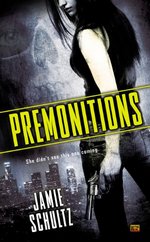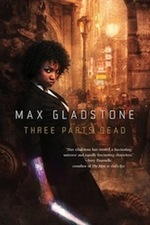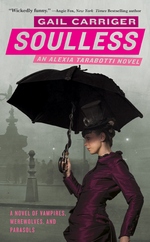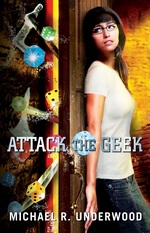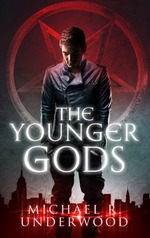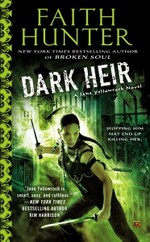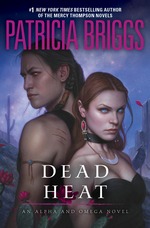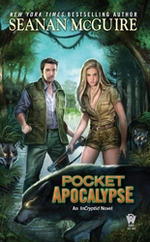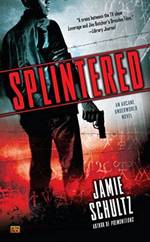 Splintered
Splintered
by Jamie Schultz
Series: Arcane Underworld, #2Mass Market Paperback, 336 pg.
Roc, 2015
Read: June 9 – 10, 2015  Last year’s Premonitions stuck with me more than many Urban Fantasies I’d consider equal to or better than it. For example: Seanan McGuire’s The Winter Long blew me away, but when I finished it, I thought about it for a couple of days and then moved on. But Schultz’ debut (which I thoroughly enjoyed) stuck around the back of my mind, and every so often I’d speculate about Karyn’s future, Genevieve’s motives, etc. Part of it was that is that McGuire’s got 7 novels of history in her series, I have (some) idea what she’ll be putting Toby et al. through in the future and had a solid idea about what had happened in The Winter Long. But Schultz is a question mark, who knew what he had up his sleeve for the future, and there were still some questions about what I’d read hanging in the back of my mind. But it was more than that — something about the book as a whole — the world as a whole — that lingered.
Last year’s Premonitions stuck with me more than many Urban Fantasies I’d consider equal to or better than it. For example: Seanan McGuire’s The Winter Long blew me away, but when I finished it, I thought about it for a couple of days and then moved on. But Schultz’ debut (which I thoroughly enjoyed) stuck around the back of my mind, and every so often I’d speculate about Karyn’s future, Genevieve’s motives, etc. Part of it was that is that McGuire’s got 7 novels of history in her series, I have (some) idea what she’ll be putting Toby et al. through in the future and had a solid idea about what had happened in The Winter Long. But Schultz is a question mark, who knew what he had up his sleeve for the future, and there were still some questions about what I’d read hanging in the back of my mind. But it was more than that — something about the book as a whole — the world as a whole — that lingered.
So, yeah, I was more than ready for Splintered by the time I got my hands on it. Thankfully, I can report that Schultz stepped up his game a bit.
It’s been a few weeks since the events of Premonitions, most wounds and injuries have healed, Karyn’s still overcome by an onslaught of visions and is unable to care for herself, Anna’s dividing her time between caring for her and running around for Enoch Sobell (while suffering emotional damage from Premonitions), Sobell’s just about finished piecing his organization back together, and everything else is returning to normal. Now, Anna and the team aren’t exactly sure what Sobell’s got them running around doing — but they’re not crazy about it.
Then things get serious — Sobell “asks” the team to do something for him that’s another level of criminality than they’ve engaged in before — with yet another inevitably following. This involves a handful of magic users in a class beyond what they’re used to. In the middle of all this, the FBI raids Sobell’s headquarters (making it difficult for him to keep the team on task). Oh, and someone’s looking for a Karyn. Someone Anna’s never heard of, and isn’t so sure about. Things get complicated, twisted, and disturbing from here — hopeful steps and/or events, are tarnished by failure or corruption; every victory looks Pyrrhic, and defeat seems inevitable.
Which is not to say that this book is all doom and gloom, a read only fit for the masochistic or self-loathing. On the contrary, there’s a lot of life in these characters, hope, gumption and devotion. You want to know what’s happening to them, you want to see them prevail in some small way (at least). This world may not be filled with blue skies, but there are patches of blue in the smog.
There’s something about the L.A. of these books that make me think Schultz is depicting a near-future dystopian city. But I’m so glad that Nail’s around so we get references to 9/11 and the Iraq War, and I can be reminded that this is taking place roughly now and that what I consider to by a dystopian future is simply a dystopian present for far too many people.
I don’t typically spend enough time thinking about titles, it’s one of those things I keep meaning to do. In this case, however, it doesn’t take a lot of effort to see the title’s applicability. At some point — if not several points — every character in this book is on their own, splintered off from the rest and looking out for their own interest with no attention or care about any one else. Occasionally, it’s in opposition to anyone else (even those they’re supposed to be aligned with). This cuts across all the various relationships depicted; from the purely financial, to the heartfelt, to the creepy and cultic. Each individual makes a deal with someone along the way — almost always for short-term gain (shorter than many expect, it should be added) and potentially long-term loss (longer than many expect). Sometimes, the characters can think that there might not actually be consequences to the deal, but they feel dirty just thinking about making it. Even those characters who start out at least partially altruistic or team/family/friend-centered in their approach to a problem, end up cutting a deal with someone. Anna, for example, primarily makes deals to help — or at least give her a chance at helping — Karyn. That act of caring doesn’t shield either one from the price to be paid for it.
Throughout Splintered (but not a stranger to Premonitions) is the deep sense that there are always consequences for one’s actions. Most serialized fiction will deal with consequences for “the big stuff” — X killed Y, so in 3 books, Y’s family will come for revenge. Or some seemingly insignificant event will turn out 5 books from now to have significant effects on the world/characters/etc. But here, every single time someone does anything magical, there are consequences, potentially (probably?) eternal consequences. This alone sets the Arcane Underworld books apart from the crowd. But it’s not just the magical actions; it’s conversations, it’s the past, it’s these deals, it’s being in the wrong place at the wrong time. What these characters do matters. Sometimes it matters for them, sometimes it matters for their loved ones, sometimes it’s their enemies. Horrifically (and realistically), sometimes, it’s complete and utter strangers. I’m not suggesting that Butcher, or Hearne, or Harrison don’t have Harry, Atticus or Rachel deal with repercussions of their actions — but somehow, Schultz is able to permeate the atmosphere with this idea. Some of his characters see the consequences and shrug them off before acting, others see the consequences and accept them, others figure they can find a way to get out of them (or have someone else rescue them).
But at the end of the day — if not before noon — no one comes out unscathed. Well, okay, some tertiary (or quaternary) characters do — but most of even them don’t. I don’t think there’s a single thing that remains the same from beginning of the book to the end — health, relationship, financial status, legal situation, family, soul — I think every character takes a hit on at least two of those, if not all. Not many authors can achieve that in 350 pages.
Lastly, I like the fact that the FBI is aware enough that strange things are happening in the world to have the Non-Standard Investigations Branch. Primarily, because it reminded me of the Chicago Police Department’s Special Investigations division in the early Dresden Files, but I also liked that the FBI is clever enough to see the need for something like that in a world where magic actually exists (see almost every other UF series for worlds where the authorities aren’t that insightful). It sure looks like they’re going to be around for a while, making life difficult for everyone. I’m looking forward to getting to see Special Agent Elliot and the rest in action.
What keeps this from getting a 5-star rating? I’m not sure I’m always engaged as I should be in either the action or with the characters. Some of that could be my subconscious refusing to get to tied to these people so that it’s easier to take when they meet the supernatural equivalent of Vic Vega/Mr. Blonde in a warehouse with a straight razor. Maybe it’s because these characters are the kind that we usually root against. Or maybe it’s just that I’m not reading it right.
Can you read this without reading the previous novel? Yeah. But I don’t recommend it, too much of this is a reaction to it.
With Premonitions, Jamie Schultz promised something new to the genre. Splintered shows us that he’s keeping that promise. I have no idea what book three of the Arcane Underworld is going to bring, but I can’t wait for it.
—–
Note: I was provided a copy of this novel by the author, which didn’t alter my opinion of the work — I can be bought, but not that cheaply.
—–



